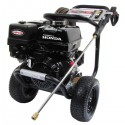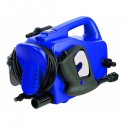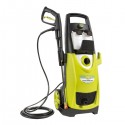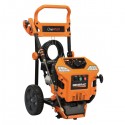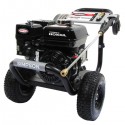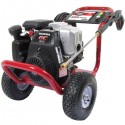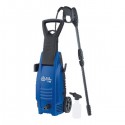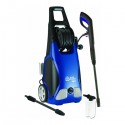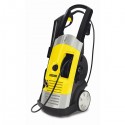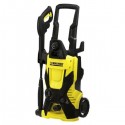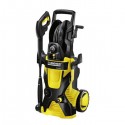Pressure Washer Reviews
These are the 10 best pressure washers based on product quality, customer satisfaction, and price:
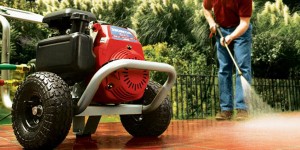 Pressure washers are extremely useful tools with a wide range of applications, both for homeowners and also small business owners who have subcontracting or landscaping operations. Pressure washers can quickly and efficiently remove loose paint, dirt, grime, and mud from a variety of surfaces, and can be used for both light cleanup jobs and heavy duty cleaning.
Pressure washers are extremely useful tools with a wide range of applications, both for homeowners and also small business owners who have subcontracting or landscaping operations. Pressure washers can quickly and efficiently remove loose paint, dirt, grime, and mud from a variety of surfaces, and can be used for both light cleanup jobs and heavy duty cleaning.
Around the home, pressure washers can be used for a lot of different things. You can use a pressure washer set to a low pounds per square inch setting to clean hard to reach windows without having to get up on an extension ladder to get to them. If you have old fashioned, double hung windows with removable screens, you can rinse off the screens when you take them out of the garage in the spring with a pressure washer. And if you have vinyl siding that tends to get grimy through the seasons, you can use a pressure washer to quickly clean it off a couple of times a year.
In the yard, you can use a pressure washer for a number of different cleanup jobs as well. You can use a pressure washer to clean your lawn furniture off, and also to rinse out your garbage cans. Organic detritus can be easily blasted off of walkways in your garden, and you can clean off your deck or patio with a pressure washer as well.
Pressure washers have automotive applications as well. A pressure washer will usually be equipped with either a reservoir for detergent and chemical solvents or else have an intake hose for drawing them from a separate container. You can use this option to wash your car with soap, and then switch back to a water only spray to rinse it off. A high pressure spray combined with a chemical solvent can also be a great way to get oil stains out of your driveway or garage floor.
Contracting and landscaping businesses will also find a number of useful applications for a pressure washer. Pressure washers can strip loose paint from walls more quickly than you can do with a manual paint scraper, and there are numerous other uses for them around job sites as well. You can clean off equipment and trucks with a pressure washer, and there are virtually no cleanup jobs in a demolition or construction job that a pressure washer can’t do quickly and efficiently.
Pressure washers have a fairly wide range of flow rates and pressures. Small handheld pressure washers have pressures between about 1200 and 1500 pounds per square inch. Larger gas powered pressure washers have PSI that are over 3000, and there are a variety of models of different sizes that fall within that range. Pressure washers can be electric or gas-powered, run hot or cold water, and are available in different styles, with different pumps, and with a variety of accessories. Whatever kind of cleanup jobs you may have, there is definitely a pressure washer out there that is right for your needs.
1. Pressure Washer Selection Criterias
1a. Pressure / Flow Rate
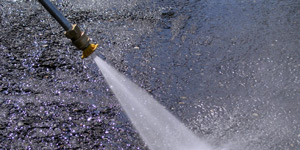 The pressure and flow rate of a pressure washer are two of the most important criteria to consider. Pressure is measured in pounds per square inch and indicates how much force the spray of water will be hitting a surface with. Pressure washers with higher PSI will be able to deal with tougher stains more quickly and easily than pressure washers with lower PSI. While pressure washers for use around the home generally have PSIs between 1500 and 2500, pressure washers for commercial use can have PSIs that are well above 3000. For the vast majority of cleanup jobs, however, you do not need a maximum PSI above about 2000. This pressure is still about three times as powerful as the kind that coin operated car washes have, and will allow you to blast just about anything off of a surface.
The pressure and flow rate of a pressure washer are two of the most important criteria to consider. Pressure is measured in pounds per square inch and indicates how much force the spray of water will be hitting a surface with. Pressure washers with higher PSI will be able to deal with tougher stains more quickly and easily than pressure washers with lower PSI. While pressure washers for use around the home generally have PSIs between 1500 and 2500, pressure washers for commercial use can have PSIs that are well above 3000. For the vast majority of cleanup jobs, however, you do not need a maximum PSI above about 2000. This pressure is still about three times as powerful as the kind that coin operated car washes have, and will allow you to blast just about anything off of a surface.
Flow rate indicates how much water is being moved through the sprayer, and it is measured in gallons per minute. The gallons per minute in smaller, residential pressure washers is typically between 1.0 and 1.5, while heavy duty commercial pressure washers can have gallons per minute of 2.5 and even higher. In order to get a good sense of the total power of a pressure washer, you have to consider the flow rate and PSI together. By multiplying the PSI and the flow rate, you get the cleaning units rating of the pressure washer. Pressure washers with a cleaning units rating that falls between 3,000 and 5,000 are best for residential uses, while pressure washers with a cleaning units rating of more than 5,000 are best suited for commercial applications.
Both the PSI and the flow rate that are listed for a particular pressure washer indicate the maximum settings for them, and you will want to have a unit that has a number of options below the maximum. More options are of course better, but a range of about five or so options is usually sufficient to provide you with enough different pressure settings for a variety of different jobs. Lower pressures are better for washing delicate surfaces like windows, screens, or your car, while higher pressures can be used to clean vinyl siding or for stripping loose paint. It is also better to use a lower flow rate on surfaces made of porous organic material, such as wooden walls, fences, and decks to keep them from getting waterlogged.
1b. Power Source
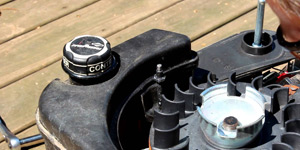 The power source you select for your pressure washer is another important criterion to consider. Pressure washers can operate on gas or electric power, and there are advantages and drawbacks to each. Gas pressure washers tend to be quite a bit more powerful than most electric pressure washers, and are generally better equipped for commercial uses. Electric pressure washers are smaller but still have impressive PSIs and flow rates, and can be used in both residential and commercial settings. The kind you select will largely be determined by what you intend to use it for. For most homeowners, electric pressure washers are best; for a number of commercial applications, gas powered units are better.
The power source you select for your pressure washer is another important criterion to consider. Pressure washers can operate on gas or electric power, and there are advantages and drawbacks to each. Gas pressure washers tend to be quite a bit more powerful than most electric pressure washers, and are generally better equipped for commercial uses. Electric pressure washers are smaller but still have impressive PSIs and flow rates, and can be used in both residential and commercial settings. The kind you select will largely be determined by what you intend to use it for. For most homeowners, electric pressure washers are best; for a number of commercial applications, gas powered units are better.
Commercial style gas powered pressure washers can have flow rates at or above 2.0 gallons per minute and have PSIs of up to 3,000 or more. These units have the advantage that they are not tethered to a power cord, and can therefore be moved around much more easily than electric units. This makes them particularly useful on job sites that may not have an electric power source available. Gas powered pressure washers are also often capable of producing a hot water or cold water spray, while electric units typically are cold water only. Hot water sprays can be particularly useful for getting tough stains out of surfaces. Commercial gas powered pressure washers can produce sprays of up to 200 degrees F.
For the vast majority of residential uses, electric power washers are usually more than able to get the job done. These units have flow rates that are below 2.0 gallons per minute, but they also have PSIs between 1500 and 2000, and typically have cleaning unit ratings of more than 3,000. Electric pressure washers can often be a lot less expensive than their gas powered counterparts, and in addition to that, they are much cheaper to maintain and run.
While electric power washers are limited by the range of their power cords, they have the distinct advantage that they do not produce any fumes or emissions, unlike gas powered units. Not only does this mean they are better for the environment, it also means they do not have the kinds of safety risks that would preclude using them indoors or in an enclosed space like a garage. With gas powered pressure washers, fumes can present a risk if the area is not well ventilated.
1c. Engine / Pump
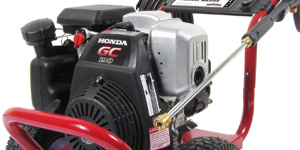 The internal components of the pressure washer, including the engine or motor (for either gas powered or electric units) and the style of the pump, are an important area to look at as well. A lot of consumers do not pay close attention to these parts, usually because they do not think they have the technical knowledge to understand them. But there are a few notes that are actually quite simple around these parts, and if you learn them you will be better off for it.
The internal components of the pressure washer, including the engine or motor (for either gas powered or electric units) and the style of the pump, are an important area to look at as well. A lot of consumers do not pay close attention to these parts, usually because they do not think they have the technical knowledge to understand them. But there are a few notes that are actually quite simple around these parts, and if you learn them you will be better off for it.
For gas powered pressure washers, find out the manufacturer of the engine. Some of the better companies that manufacture high quality engines for small machines include Briggs & Stratton, Kohler, and Honda. You should also take a look at the engine’s specs, including its displacement, horsepower, and torque. These are fairly simple metrics that together indicate how much power the engine is packing. Displacement is measured in cubic centimeters and indicates the overall size of the engine. Horsepower is probably the most familiar metric for engine power; for smaller pressure washers anything above 3.5 HP is going to be pretty robust. Torque measures the rotational power the engine supplies and it is measured in foot pounds.
For electric pressure washers, pay attention to the wattage and amperage. Generally, electric pressure washers will run somewhere between 1500 and 2000 watts and have amperages between 10 and 15 volts. On the one hand, having a motor that uses higher amp and watts can be enticing, since it means that the machine will be more powerful, and ultimately better equipped to produce higher PSI and flow rates. But on the other hand, it is important to make sure you are not getting a pressure washer that will draw too much power from the circuit you will be running it on, especially if you run other appliances on that same circuit. I would not recommend getting an electric pressure washer that draws more than 14 amps to be safe.
There are two styles of pumps on pressure washers: axial and triplex. Axial pumps are far more common than triplex pumps. Triplex pumps are more efficient than axial pumps and have fewer moving parts, but pressure washers that have them are also more expensive. For commercial operations that will be using the pressure washer a lot, a triplex pump can be the better way to go, but for residential applications, a pressure washer with an axial pump should be fine.
1d. Design / Accessories
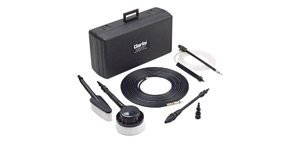 The overall design of the pressure washer is going to have major effects on its overall ease of use and functionality. It is best to try to find a pressure washer that combines high PSI and flow rate with a compact overall footprint, and make sure it is also fairly lightweight. Most mobile pressure washers do not tend to be very big, and you should be able to find one that will fit easily in the back of your truck or can be tucked away in your garage or basement without taking up too much room. Units that have frames made of aluminum or other lightweight material are also going to be easier to maneuver and carry.
The overall design of the pressure washer is going to have major effects on its overall ease of use and functionality. It is best to try to find a pressure washer that combines high PSI and flow rate with a compact overall footprint, and make sure it is also fairly lightweight. Most mobile pressure washers do not tend to be very big, and you should be able to find one that will fit easily in the back of your truck or can be tucked away in your garage or basement without taking up too much room. Units that have frames made of aluminum or other lightweight material are also going to be easier to maneuver and carry.
The accessories a pressure washer has will affect how versatile it is and how many different types of jobs it can perform. Accessories include the hose, wand, nozzle tips, and detergent reservoir or intake tube. You want to make sure that you are getting a pressure washer that has a good range of accessories so you have options when you are using it. You also want to make sure that the different parts like the hose or detergent reservoir are designed to make it as easy to use as possible.
The hose should be at least 20 feet long – 30 would be ideal – and it should have a diameter of at least 1/4 an inch. Materials like polyurethane are fine for residential jobs. The connection should be threaded (it almost always is), and there should be a design feature for winding up and storing the hose – at the very least, a hook on the frame of the pressure washer. The machine should have either an intake hose or reservoir for detergent; some machines come with dual detergent reservoirs. The reservoir is more convenient than the hose option, but you want a machine with one or the other.
The wand will most likely come with a set of nozzle tips that provide different PSIs, although there are models available that allow you to control the PSI by how much pressure you are putting on the trigger. These models tend to be more expensive, though, and you can’t control the pressure easily with them, the way you can with a nozzle tip. More nozzle tips are always better, because it gives you a wider range of options for different PSIs, but at the same time you usually will not need more than five or six for most household applications.
1e. Pricing
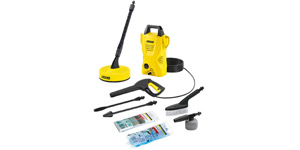 Once you have figured out whether you need a commercial or residential style pressure washer, and determined what power source, PSI, and flow rate are best for your needs, you will have narrowed your search down considerably. At this point, you have to determine how much you want to spend on your pressure washer. Each kind of pressure washer is going to have a different price range; for example, small electric pressure washers can often be less than two hundred dollars, while big, truck-mounted commercial units will run well over a thousand. At the same time, within each category you will find some variation in price, and it is important to know how to spot a deal.
Once you have figured out whether you need a commercial or residential style pressure washer, and determined what power source, PSI, and flow rate are best for your needs, you will have narrowed your search down considerably. At this point, you have to determine how much you want to spend on your pressure washer. Each kind of pressure washer is going to have a different price range; for example, small electric pressure washers can often be less than two hundred dollars, while big, truck-mounted commercial units will run well over a thousand. At the same time, within each category you will find some variation in price, and it is important to know how to spot a deal.
The best way to do this is not by shopping purely by price. While it can be awfully tempting to have search results sorted by price from low to high, and start looking at the cheapest ones, this is not always a good way to buy a new appliance. Instead, it is better to apply the criteria like PSI and flow rate, and carefully look at the engine make and specs and find out what kind of pump each machine has. That way, you can have a search that is based on overall quality and ability, and from that solid foundation you can get a much better sense of what you should be spending on a pressure washer.
The same rule applies at the other end of the price spectrum: do not think that just because a model is the most expensive on the list that it is the best one. More expensive units often do have justifiable price tags, and can be better for a number of design reasons, but it is not always the case. Again, it is better to look for product specs that will fit your needs and provide a quality cleaning experience rather than be blinded by price tags.
But price does matter, and the adage that you get what you pay for does apply here. Because of this, it’s better to avoid the ends of the price range and try to find a model that has the appropriate product specs and falls somewhere in the middle of the range. The cheapest models will also have the cheapest parts and manufacturing, while the most expensive units are usually pretty much the same quality as those in the middle of the range.
2. Pressure Washer Reviews
You can find pressure washers that are powered by gas or electricity, and there are pressure washers intended for commercial uses and residential applications. Determining which one is right for your needs can be a bit of a challenge, but with the help of my guides and reviews you can find the best one for you.
2a. Electric Pressure Washer Reviews
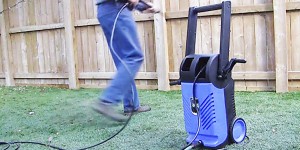 Electric pressure washers have a number of unique advantages. They are much cheaper to run and maintain than gas powered pressure washers, they’re much quieter, and they do not produce any fumes or emissions when you use them, which is better for the environment as well as safer. Electric pressure washers typically have PSIs of between 1200 and 2500 and flow rates between one and two gallons. While they are particularly useful for household applications, they can also be used by many small contractors and landscaping operations as well. They have a wide range of uses, and the kind of power and performance you depend on.
Electric pressure washers have a number of unique advantages. They are much cheaper to run and maintain than gas powered pressure washers, they’re much quieter, and they do not produce any fumes or emissions when you use them, which is better for the environment as well as safer. Electric pressure washers typically have PSIs of between 1200 and 2500 and flow rates between one and two gallons. While they are particularly useful for household applications, they can also be used by many small contractors and landscaping operations as well. They have a wide range of uses, and the kind of power and performance you depend on.
- Best Use: Smaller cleanup jobs with an available power source.
- Pros: Quiet, produce zero emissions and are inexpensive.
- Cons: Power source required, limited by the length of the cord.
2b. Gas Pressure Washer Reviews
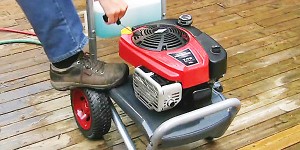 Gas pressure washers have the kind of powerful engines needed to produce high pressure sprays that are great for tough stains and big jobs. Gas pressure washers produce PSIs in excess of 2500 and have flow rates of two gallons per minute or more. These machines are also equipped to produce heated sprays, and can produce sprays of up to 200 degrees Fahrenheit, which is useful for stains that are not water soluble, or in areas that have to be sanitized. Gas pressure washers can go anywhere, but you should avoid using them in enclosed spaces where fumes can be a problem.
Gas pressure washers have the kind of powerful engines needed to produce high pressure sprays that are great for tough stains and big jobs. Gas pressure washers produce PSIs in excess of 2500 and have flow rates of two gallons per minute or more. These machines are also equipped to produce heated sprays, and can produce sprays of up to 200 degrees Fahrenheit, which is useful for stains that are not water soluble, or in areas that have to be sanitized. Gas pressure washers can go anywhere, but you should avoid using them in enclosed spaces where fumes can be a problem.
- Best Use: Big, tough jobs that need high PSI and flow rate.
- Pros: Powerful sprays, hot water option, and no limit to range.
- Cons: Noisy, produce fumes and emissions that can be dangerous.
2c. Residential Pressure Washers Reviews
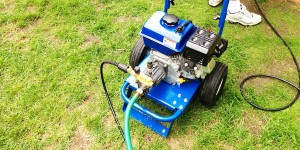 For a wide variety of applications around the home, residential pressure washers are a great tool. They have the kind of power you need to easily and quickly clean your car or SUV, vinyl siding, fences and walls, and driveways and walkways. You can also spray down lawn furniture and garbage cans, clean windows and window screens, and wash your garage floor with residential pressure washers. These models are smaller than commercial pressure washers but still have the ability to produce high pressure sprays that can get tough stains and stubborn grime off of any surface on your home quickly.
For a wide variety of applications around the home, residential pressure washers are a great tool. They have the kind of power you need to easily and quickly clean your car or SUV, vinyl siding, fences and walls, and driveways and walkways. You can also spray down lawn furniture and garbage cans, clean windows and window screens, and wash your garage floor with residential pressure washers. These models are smaller than commercial pressure washers but still have the ability to produce high pressure sprays that can get tough stains and stubborn grime off of any surface on your home quickly.
- Best Use: Exterior of the home, decks, autos, and in the yard.
- Pros: Effective for a wide variety of applications.
- Cons: May have somewhat limited PSI and flow rates.
2d. Commercial Pressure Washers Reviews
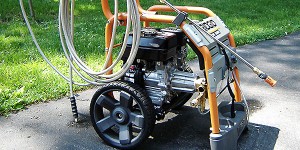 Commercial pressure washers are the biggest and baddest of the bunch. These machines are designed to handle big, heavy duty cleaning jobs. There are smaller commercial units that can nevertheless produce a high pressure spray – more than 3,000 PSI – with a flow rate of more than two gallons per minute. And there are massive units that have to be mounted on a truck or trailer bed and allow you to wash any large surface you can drive to. Commercial pressure washers have a wide variety of applications on construction and other work sites, and can cut down on labor considerably.
Commercial pressure washers are the biggest and baddest of the bunch. These machines are designed to handle big, heavy duty cleaning jobs. There are smaller commercial units that can nevertheless produce a high pressure spray – more than 3,000 PSI – with a flow rate of more than two gallons per minute. And there are massive units that have to be mounted on a truck or trailer bed and allow you to wash any large surface you can drive to. Commercial pressure washers have a wide variety of applications on construction and other work sites, and can cut down on labor considerably.
- Best Use: Job sites, construction sites, contracting businesses.
- Pros: Large and powerful, with the highest PSIs and flow rates.
- Cons: Rather expensive, and sometimes require a trailer or truck mount.
Pressure washers have a wide range of applications and uses, and they have the kind of power and performance you need to reliably tackle big, heavy duty cleaning jobs. Whatever use you may have for them – whether around the home or on the job site – there’s a pressure washer out there that’s right for you.
These are the 10 best pressure washers based on product quality, customer satisfaction, and price:

